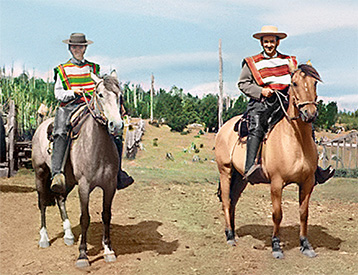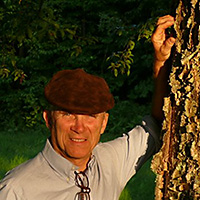Talking with David Mather (Chile 1968–70)
David Mather (Chile 1968–70) has published his second novel with Peace Corps Writers.
One for the Road, David’s first novel, published in 2011, tells the story of Tom Young, a Peace Corps Volunteer who served in Chile, and how that experience changed his life. Now in 2014, David has published a sequel, When the Whistling Stopped, that finds Tom going back to Chile 30 years after his service to resolve past heartaches. Once there he finds himself in the middle of tackling big-company pollution and the endangering of species.
I talked with David about his Peace Corps experience and both of his books. — Marian
•
David, tell us about you educational background.
I attended Bowdoin College in Brunswick, Maine and received a Bachelor of Arts with a major in History, and a minor in English Lit..
.
What was your Peace Corps Assignment?
I was a “B.A. generalist” doing reforestation work, coupled with community development projects, in the Colony of Cufeo outside Valdivia in southern Chile from 1968 to 1970.
.
Tell us about where you lived and worked.
Cufeo was a community of campesino [peasant] farms and one-room schoolhouses scattered in the hills. Travel was by foot, horse, and oxen. During the winter it rained over a hundred inches, making the roads and trails treacherous. There was no indoor plumbing or electricity — water was fetched from springs with buckets.
Only a generation earlier, the area was totally covered in virgin hardwood forest. The Chilean government doled out free tracts of land to families willing to clear the land for farms. By the time I arrived, the only wood that remained was down in steep ravines or up high in inaccessible areas. The soil turned out to be lousy, and the campesinos, not being able to afford fertilizer, were eking out a living by cutting firewood and making charcoal. The little wood that remained was incredibly difficult to work up, extract, and deliver by oxcart many miles away to the Pan American Highway. Reforestation was their only chance for an economic future.

David and the "father" of his host family
.
What have you done since the Peace Corps?
 During my two years in Cufeo, I discovered that I loved simple, rural life. When I returned to the States, I cloned my PCV living situation by buying a small piece of land in the New Hampshire woods and, like the Cufeo “colonists,” carved out a homestead. Probably the biggest difference between life in Cufeo and in New Hampshire was that here the temperature can get down to thirty degrees below zero.
During my two years in Cufeo, I discovered that I loved simple, rural life. When I returned to the States, I cloned my PCV living situation by buying a small piece of land in the New Hampshire woods and, like the Cufeo “colonists,” carved out a homestead. Probably the biggest difference between life in Cufeo and in New Hampshire was that here the temperature can get down to thirty degrees below zero.
I became a self-educated forester, performing about every function there is to do in the woods, before starting an extremely-high-quality and specialty lumber business that resulted in my traveling all over the East to purchase exceptional logs and rendering them into various cuts of kiln dried lumber. Being self-employed, I was able to continue to travel abroad a great deal, primarily to third world countries.
.
 What type of book is When the Whistling Stopped?
What type of book is When the Whistling Stopped?
I describe it as an “eco-thriller” that carries a message. Wildlife and this planet I hold very dear; unfortunately, I believe man and his greed are destroying them.
.
How long have you been thinking about writing this book?
 I actually began writing When the Whistling Stopped in my head while I was still working on my first novel. I was in Chile doing research for One for the Road when I learned of the demise of thousands of black-necked swans in the area. I learned also that much of the wood that I helped to plant had matured and was contributing to pollution. It seemed like a slam-dunk opportunity for a sequel when, thirty years later, the first book’s main character — a PCV who planted trees — returns, learns what is happening, and becomes involved in exposing a saw mill’s pollution.
I actually began writing When the Whistling Stopped in my head while I was still working on my first novel. I was in Chile doing research for One for the Road when I learned of the demise of thousands of black-necked swans in the area. I learned also that much of the wood that I helped to plant had matured and was contributing to pollution. It seemed like a slam-dunk opportunity for a sequel when, thirty years later, the first book’s main character — a PCV who planted trees — returns, learns what is happening, and becomes involved in exposing a saw mill’s pollution.
.
How long did it take to write When the Whistling Stopped?
After thinking about writing a novel about Chile and the Peace Corps for over twenty-five years, I finally began to have the time when I downsized my lumber business. My first book took five years, part time, to complete. When the Whistling Stopped took about two years, also part time.
.
Having had the experience of already writing a novel, did you do things differently the 2nd time?
Not really. I just keep plugging away, listening to feedback, paying a lot more attention these days as to how other writers do things. I feel that I am ever-so-slowly improving as a writer.
.
What is you writing routine?
I generally walk a couple of miles first thing in the morning to loosen up my lower back which allows me to spend between three and four hours writing at a desk. I am still very active and, unfortunately, often put my writing on the ‘back burner.’
.
Did you need to do any research for the book? What kind?
My research consisted of conversations with people from the Valdivia area and visiting the areas of Chile covered in the book. I also used the Internet to read articles about the pollution, its consequences, and succeeding court actions.
.
What are you planning to do to promote When the Whistling Stopped? What did you do for One for the Road?
As much as I enjoy writing, the opposite is true with marketing. My two books are self-published, and, consequently, the door is often shut in my face when I try to gain exposure. That said, I have done numerous readings, mostly at libraries and independent bookstores for my first book. I have also attended a few book events, and have been interviewed both by a radio station and local newspapers. I attended the National Peace Corps Convention two summers ago in Boston where I traded copies of my first book for contributions to a Paraguayan charity.
Presently, I am trying to have well known environmental groups read my book so that they might recommend it, as well as receive positive blurbs from them that I could use for credibility. I feel that, somehow, the book’s concern for the environment plus its readability are its two hooks. Presently, my wife and I are arranging readings for the new book, and will add material to my website as it develops.
.
Do you plan to continue writing?
Yes. I’m actually over 80 pages into another novel called Crescent Beach about a little town on the Gulf Coast of Florida in 1993.
I would spend a lot more time writing if my wife and I didn’t live off-grid in N.H. 6 months out of the year because there is just so much to do — whether mowing fields, maintaining a mile long road, thinning woodlots, taking care of all repairs and systems including electricity, etc. That, plus we still travel, and plan to continue to do so as long as we are physically able.
.
Thank you, David, and best of luck with your writing — and marketing.
•
To purchase either of David’s books from Amazon.com, click on either the book cover or the bold book title — and Peace Corps Worldwide, an Amazon Associate, will receive a small remittance that will help support our annual writers awards.
Although Colombia was my Peace Corps posting, having lived in Chile for the past forty-two years, I look forward to reading your book, David. Environmental issues are a big topic here now in the media. As a birder, I was especially concerned with the plight of the black-necked swans who are now making a comeback.
Good luck with your book!